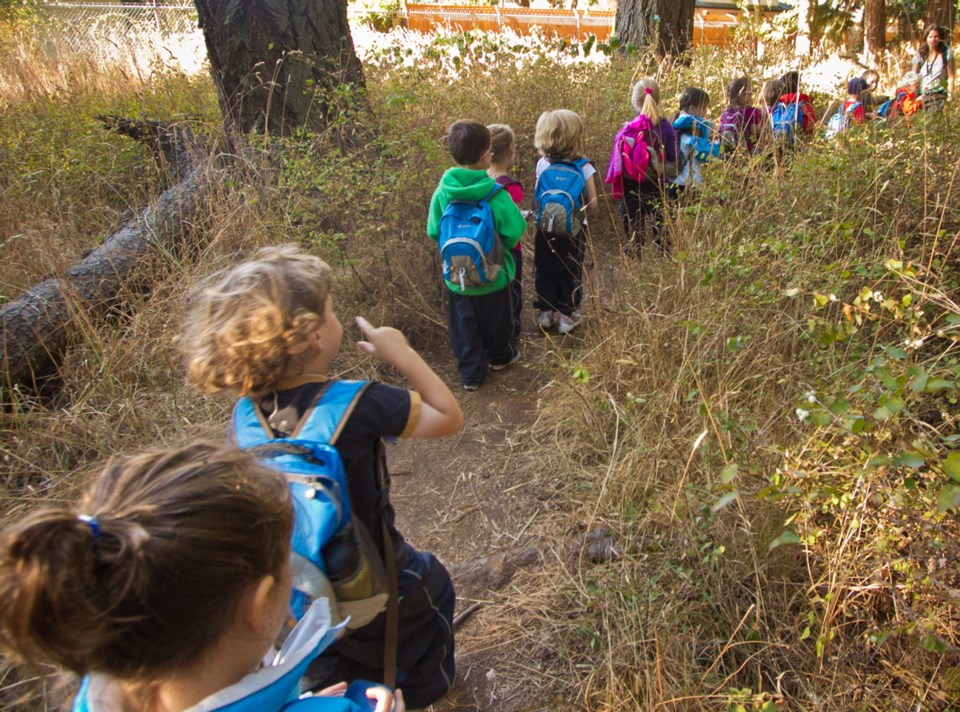A nature kindergarten pilot program at two James Bay elementary schools will go ahead next fall along with a new French immersion stream at George Jay Elementary.
The Greater Victoria school board approved both programs at a busy meeting Monday night during which trustees also lifted a ban on wireless technology in elementary schools.
The French immersion program received unanimous support, but the other issues were more contentious.
The nature kindergarten program was approved for James Bay Community School and South Park Family School despite objections from the Greater Victoria Teachers’ Association.
Union president Benula Larsen said the program does not have the full support of teachers in the schools, where students will spend part of their day exploring Beacon Hill Park, the beaches along Dallas Road and a number of other parks and coastal areas near their schools.
Larsen has raised concerns about student safety, lack of consultation, and the creation of another “program of choice” that will draw students from across the district at the expense of other neighbourhood schools. The union argues that nature kindergarten should be offered to all students instead of a select few.
But trustees voted 8-1 to approve the program as a two-year pilot project with the expectation that it will soon expand to other schools.
“It is my hope that this program will be a huge success,” board chairwoman Peg Orcherton said. “I don’t see why we can’t have it in all of our kindergarten programs at some point.”
Trustee Diane McNally was the lone opposing vote. She praised the program, but said it should be offered more broadly, rather than in select schools.
On the issue of Wi-Fi in schools, the board split 5-4 in favour of lifting the moratorium on installation in kindergarten to Grade 5 classes.
The issue has been a source of heated debate in the district for years.
When asked whether, given the choice, they would enrol their child at a school equipped with Wi-Fi technology, 43 per cent of parents said they would. But a significant minority — 27 per cent — disagreed or strongly disagreed, while 30 per cent had no firm opinion.
Of those with concerns, a number have focused on the long-term health effects of radio-frequency radiation from Wi-Fi routers. The parents remain skeptical of assurances from public health officials that the technology is safe, arguing that some of the scientific research has been paid for by industry.
Wi-Fi’s proponents, meanwhile, say it will give teachers and students a valuable learning tool and that school trustees should leave health and safety decisions to the experts.
Health Canada says it has determined, based on extensive scientific evidence, that “exposure to low-level [radio-frequency] energy, such as that from Wi-Fi equipment, is not dangerous to children.”
The board majority backed a recommendation by the Victoria Confederation of Parent Advisory Councils to permit Wi-Fi in elementary schools on the condition that each school obtain the support of its local community, including teachers, parents and staff.
Tom Ferris said a number of schools have been waiting for Wi-Fi while the district debated the issue.
“I think there’s no reason to be holding them up now,” he said. “We’ve been at this for quite some time now. Communities will make their own decisions and that is the tradition of school boards in British Columbia.”
A minority of trustees argued that the board should err on the side of caution and protect student safety.
“We have to take the precautionary approach to it and we have to really think about the long-term effects of it on some of our children that have sensitivity to it,” Edith Loring-Kuhanga said.
McNally said students can still have access to technology and the Internet through hard-wired systems.
“Internet access is the tool, not Wi-Fi,” she said.
In other news, trustees tabled debate on their own salaries until October 2014, which is just before the next municipal election.



